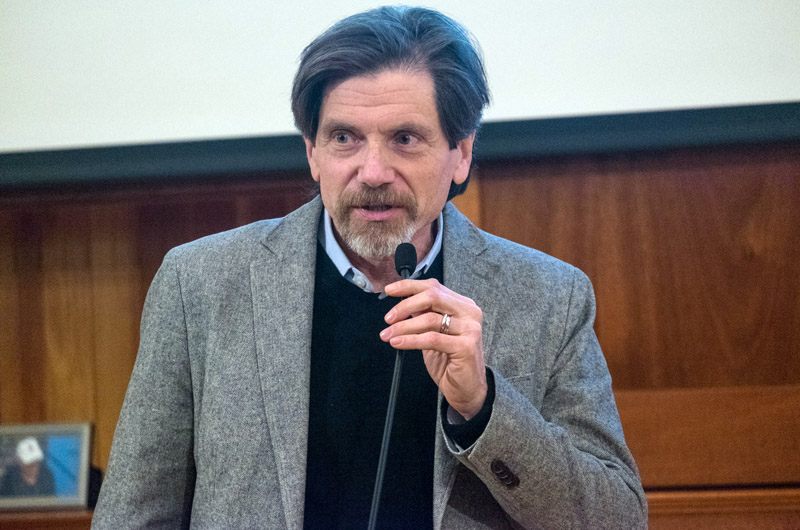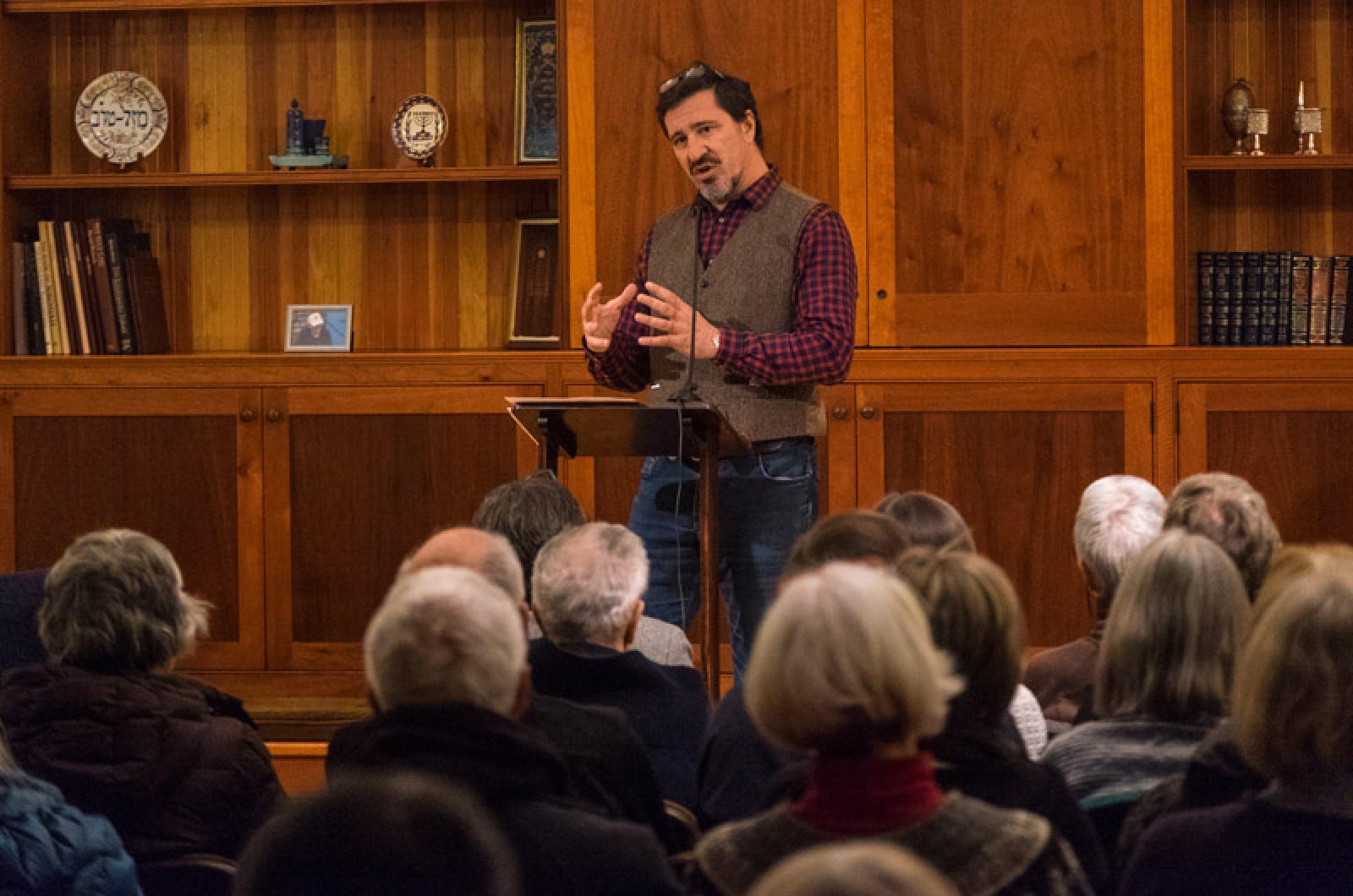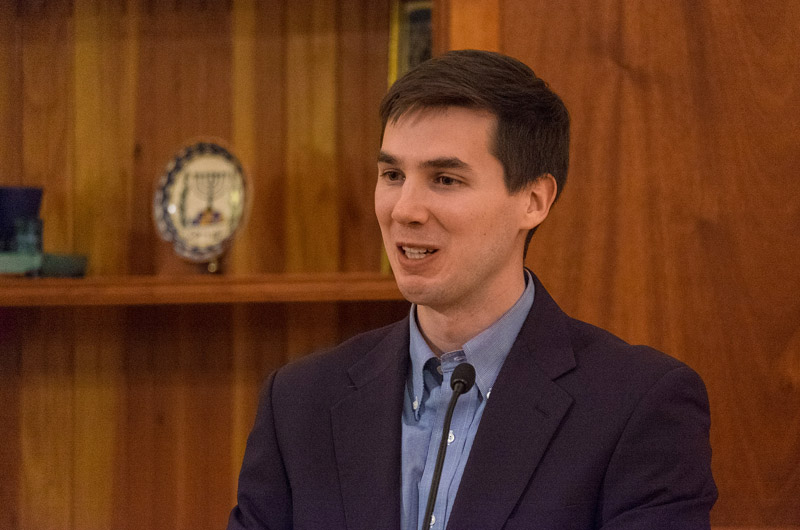A discussion of state, national and global policies to address climate change drew a crowd to the Martha’s Vineyard Hebrew Center on Monday.
The hourlong forum, Climate Change in an Alternative-Facts Era, came against a backdrop of federal efforts to roll back key environmental regulations adopted under President Obama, but also a roster of proposed bills in Massachusetts aimed at stemming the effects of climate change.

About 80 people attended the event, which featured state Rep. Dylan Fernandes, Woods Hole Research Center president and director Philip Duffy, and Vineyard Power president and director Richard Andre as speakers.
Mr. Andre, who founded the energy cooperative Vineyard Power in 2009, gave an update on Vineyard Wind, a partnership with the Danish company OffshoreMW and one of two wind projects planned in federal waters south of the Vineyard. The project is still in the permitting phase, with development likely years away. Another Danish company, Dong Energy, is at a similar stage in its plans for a wind farm in an adjacent area.
Looking ahead, Vineyard Power has drafted a bill that would allow towns and cities to sign long-term contracts for renewable energy. Mr. Fernandes said the bill has gained bipartisan support on the Cape, at least partly as a result of its emphasis on local control.
“I am one of two Democrats in the house for the entire Cape, but I think we got every Republican on the Cape to sign on,” he said.
The state representative gave a rundown of other proposed bills that could reduce greenhouse gas emissions, including two proposed carbon taxes (one requiring that 20 per cent of revenue support renewable energy development), and a bill calling for the repair of gas leaks, which Mr. Fernandes said have been costing taxpayers at least $100 million a year.
He said Massachusetts has been a national leader in clean energy and combating climate change, in part through its commitment to wind and solar power initiatives. Among other things, the state adopted a bill last year requiring energy utilities to buy at least 1,600 megawatts of offshore wind energy over 10 years.
“People call this the Saudi Arabia of wind,” Mr. Fernandes said, noting the especially abundant resource off the state coast. “We can really be a leader to the rest of the country.”
Mr. Duffy, a physicist and former member of the White House National Science and Technology Council under President Obama, broadened the discussion to include national and global issues. Despite actions by the current administration, he said, climate change progress would continue, largely as a result of market forces and climate policies.
“Where the battle to control climate change will be won or lost is in the developing world,” he said, since rapid population growth in those countries creates the potential for rapid increases in greenhouse gas emissions. He highlighted some of his group’s work around the world, including helping countries measure and report their emissions, and countering the effects of deforestation through better land management strategies.
The Woods Hole Research Center has been ranked the number one climate-change think tank in the world three years running by the International Center for Climate Governance.
Mr. Duffy drew attention to the 195 countries that signed on to the Paris Agreement in 2015, the first comprehensive climate agreement in the world, which involves each country setting its own goals for reducing greenhouse gas emissions. He said the flexibility increased buy-in among countries, although the current commitments taken together will not solve the problem. But he also noted that the agreement requires a gradual stepping up of commitments over time, which could eventually avert a two degree Celsius rise in global temperature, which scientists say could trigger catastrophic changes.
In many countries deforestation accounts for the largest source of carbon emissions, after of the burning of fossil fuels. And permafrost, which as a whole may contain about twice the climate-warming gasses currently in the atmosphere, presents a severe threat as the planet warms, Mr. Duffy said.
Despite the daunting nature of the problem, Mr. Duffy encouraged people to stay involved. He also pointed to growing efforts within the business community and again stressed the falling price of renewable energy. He encouraged people to take action at home and in their communities and to identify themselves to their local representatives as climate-change voters.
“As the federal government steps back from doing what it should be doing, it’s more important than ever for the rest of us to do even more,” he said.








Comments
Comment policy »